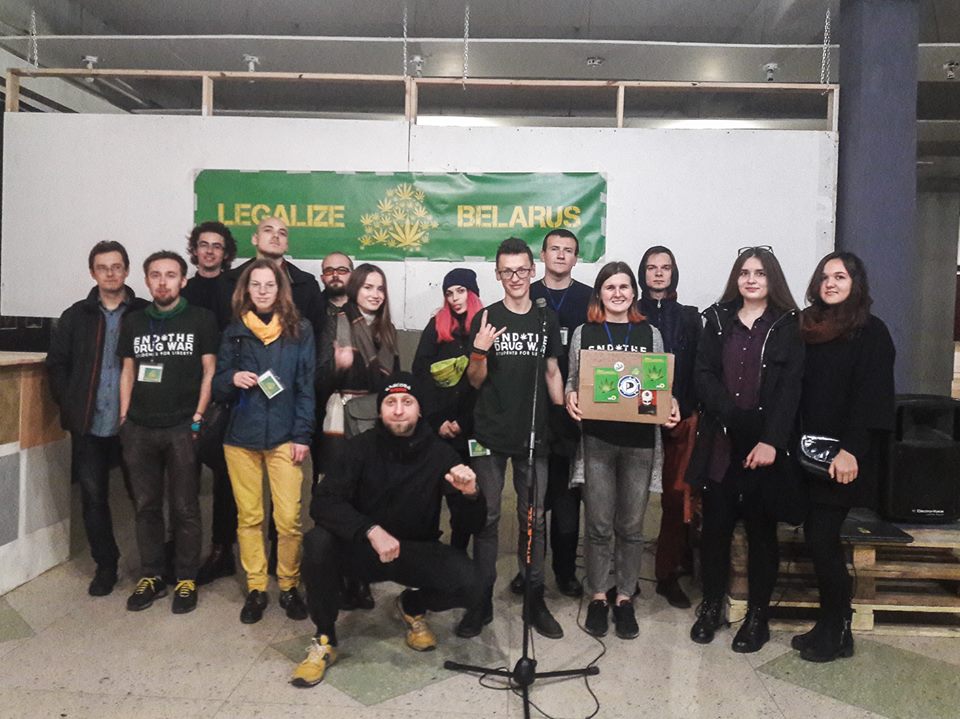
By KSENIYA TARASEVICH
The civilized world is moving fast to legalize, or at least decriminalize, cannabinoids. Meanwhile in Belarus, owning just 1 gram of marijuana can get you 2 years in prison — which, in actuality, means up to 8 years. This is how the Belarusian drug policy is failing the people of Belarus.
The War on Drugs in Belarus
The Belarusian drug policy is a continuation of the Soviet one. In the BSSR (Belarusian Socialist Soviet Republic) there were no drugs. Just like sex.
“The main (official) reason for the intensifying drug war was the spread of so-called ‘smoking blends’, different kinds of natural or synthetic non-tobacco mixes for smoking. They appeared in the middle of the 2000s and were seen as a legal equivalent of marijuana,” said Piotr Markielau, communications coordinator at Legalize Belarus.
In the early 2010s Belarus saw a series of heavy cases of “spice-abuse”. The teenage victims would mutilate themselves or commit suicide under the influence of synthetic smoking blends.
The Belarusian government tried to manage the issue with Presidential Decree №6 “concerning prompt measures to counteract illegal drug trade” in late 2014.
This decree extended the maximum prison term for drug related offenses to 25 years. Practically every article of the Belarusian penal provision 328 had its term extended. Administrative fines for being under the influence in public were established as well. Fines range betweenfrom 6,057 and 120,115 USD.
Other changes included a simplified procedure to amend the list of forbidden substances, which led to spice being targeted quickly.
“The road to hell is paved with good intentions. The decree opened a Pandora’s box, which became the basis for many unfair and often wrongful sentences. Criminal cases involving drugs became an easy chance for policemen to gain more ‘stars on their shoulders’ and they began to actively churn out sentences without thorough investigation,” Piotr Markielau said about the government policy.
Ever-increasing pressure
Most offenders get caught at so-called “stashes” – places where they come to buy drugs. However, the fairest Belarusian judicial system, “Lady Justice”, accuses buyers of disbursal, which is a separate provision and an additional charge. While acquiring drugs in Belarus carries a prison sentence of between 2 and 5 years, the same offense with intent to sell carries a 5 to 8-year term. It should be noted that courts even consider passing a joint to a friend to be ‘selling’.
In 2016 there was a total of 34,000 Belarusians behind bars. Out of them, 3,600 were convicted under provision 328 of the Criminal Code (‘Illegal drug turnover and sale’). Most of the accused had to wait 2 to 3 years for a verdict. Only 1,568 people were sentenced in the first 6 months. Most of the accused turned under the mills of justice in the last 2-3 years. According to the data provided by the “Mothers’ Movement” initiative (relatives of the convicted alliance), those convicted received an 8-year term on average.
Today, hemp and other drugs are banned in Belarus in most cases (with some medical exceptions). Industrial use of cannabis is banned, too. Even products that do not contain THC are forbidden in Belarus, like hemp paper, which can be produced in a much more sustainable manner than from trees.
Growing cannabis is prohibited as well, even though the Belarusian climate is not that favorable for cannabis and the amount of THC it contains is drastically small as a result.
Fighting against the war on drugs
Legalize Belarus is working to tackle namely these tough measures. The initiative raised awareness about psychoactive substances and advocacy campaigns and provided psychological support to those imprisoned.
Activists organized public events all around Belarus, creating places for sharing everything concerning the Belarusian and the worldwide war on drugs. They also collected signatures for changing the current law and sent postcards to those imprisoned.
No doubt that the brightest, most provocative and most visible move so far was “Hemp Kaliada”. Kaliada is an ancient Belarusian Christmas tradition. During Kaliada people gather in the streets dressed in bizarre clothes and sing various songs.
“We turned the whole tradition of the Belarusian Kaliada around, put on colorful costumes, took cannabis crooks and went onto Kaliada. It was marvelous: people were waving at us, cheering us when they saw what was going on. It’s quite visible that the topic is relevant not only for a narrow circle of activists,” Piotr said.
But the creativity hasn’t been appreciated by the Bbelarusian authorities. On January 10, Piotr received a letter. It said that administrative proceedings have been initiated against him. The activist could be fined up to 230-575 USD or even put in jail for up to 15 days for an “unauthorised meeting”.

